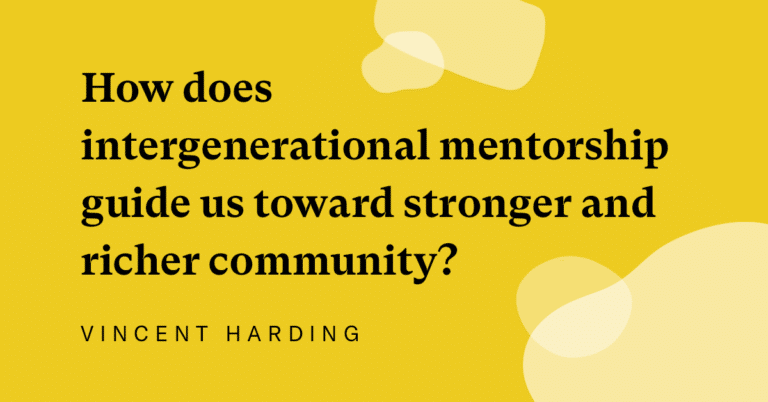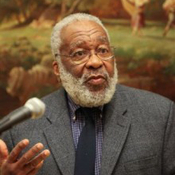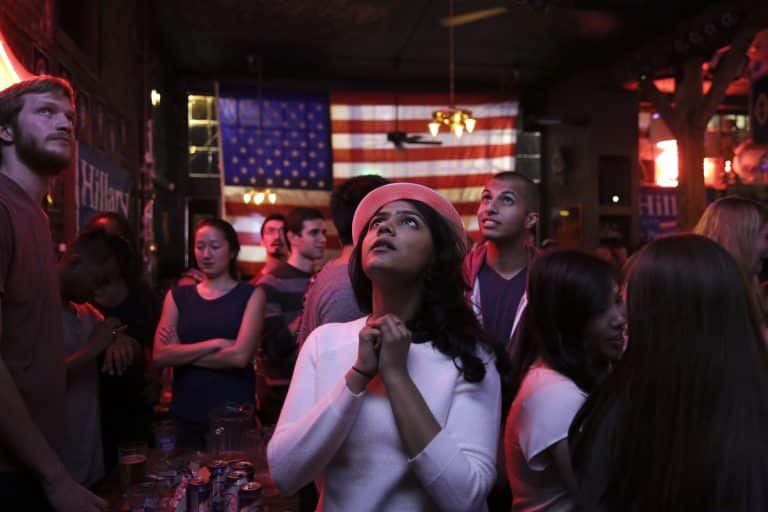Vincent Harding
Our Lives Can Be Signposts for What's Possible
A civil rights elder and speechwriter for Martin Luther King, Jr., the late Vincent Harding brought the wisdom of the movement to young people in hurting places. He offers the image of a “live human signpost” as a guiding light toward the kind of support and mentorship we can offer one another in the path toward a beloved community. “When it comes to creating a multiracial, multiethnic, multireligious, democratic society, we are still a developing nation,” he says. “But my own deep, deep conviction is that the knowledge, like all knowledge, is available to us if we seek it.”

© All Rights Reserved.
Guest

Vincent Harding was chairperson of the Veterans of Hope Project at the Iliff School of Theology in Denver. He authored the magnificent book Hope and History: Why We Must Share the Story of the Movement and the essay “Is America Possible?” He died in 2014.
Transcript
[music: “Sun Will Set” by Zoë Keating]
Krista Tippett, host: I’ve had hundreds of big conversations, and my conversation partners share wisdom I carry with me wherever I go. Here’s an image I love from the late Vincent Harding of what we can all be: “Live human signposts.” Vincent Harding himself was a live human signpost. He remains a mentor to me and countless others. He was a central figure in the civil rights movement, a speechwriter for Martin Luther King, Jr. He spent the rest of his life on a project called Veterans of Hope, bringing the wisdom of the movement to young people in hurting places.
This is Becoming Wise. I’m Krista Tippett.
Ms. Tippett: There’s a story you tell that was about your conversation, encounter, you were having in a hard neighborhood in Boston — and a young man named Darryl. Would you tell that story about signposts, his image of signposts?
Vincent Harding: What I remember from that story was that a dear young friend of mine, Eugene Rivers, young at that time — I guess Gene’s going to feel old.
Ms. Tippett: Still busy in Boston.
Mr. Harding: Still busy in Boston. I met this young man in Eugene’s apartment, and this young man came up just to sit next to me because he wanted to talk in a more personal way. It turned out that he was one of the leaders of the drug-running folks at the time. But what he said to me was that he really felt that one of the reasons why he had gone in the way that he had gone — not trying in any way to excuse himself — was the fact that he, like many other young people, were operating in a situation where they felt it was just very, very dark all around them. And what they needed were, as he put it, some signposts, some lights that would, in other people’s lives, help them …
Ms. Tippett: “Live human signposts,” you wrote.
Mr. Harding: Yes — that would help them to see the possibilities for themselves and will open up possibilities that other people can’t see in any other way except seeing it through human beings who care about them. And if we teach young people to run away from the darkness rather than to open up the light in the darkness — to be the candles, the signposts — then we are doing great harm to them and the communities that they have come out of.
Ms. Tippett: I think this word “signpost” and this image of signpost is really important. I think it’s an important piece of practical vocabulary. What you also tell young people is that they have to find the elders, right? I’ve thought a lot over the years about the teaching in the Hebrew Bible and the New Testament that I think has resonance across the traditions of developing eyes to see and ears to hear. I think of that as almost a spiritual discipline that the 21st century makes more necessary.
Mr. Harding: That whole idea of discipline is one that, clearly, we have cast aside except when we’re talking about technological development or military development. It seems to me that we need, again, to recognize that to develop the best humanity, the best spirit, the best community, there needs to be discipline, practices of exploring, how do you do that? How do we work together? How do we talk together in ways that will open up our best capacities and our best gifts?
My own feeling that I try to share again and again, Krista, is that when it comes to creating a multiracial, multiethnic, multireligious, democratic society, we are still a developing nation. We’ve only been really thinking about this for about half a century. But my own deep, deep conviction is that the knowledge, like all knowledge, is available to us if we seek it.
I think that that determination to find a truly democratic society and to create the truly beloved community, those are things that can be available to us if we’re willing to work with each other and work with the universe on developing them. They don’t come free and easy. They are tough, tough tasks for us to take on.
[music: “Sun Will Set” by Zoë Keating]
Ms. Tippett: Vincent Harding taught at Iliff School of Theology. He authored the magnificent book Hope and History: Why We Must Share the Story of the Movement and the essay “Is America Possible?”
Becoming Wise is produced at On Being Studios, which is located on Dakota land. Our team is Marie Sambilay, Lily Percy, and Chris Heagle, and our theme music is provided and composed by Zoë Keating.
Books & Music
Recommended Reading
The On Being Project is an affiliate partner of Bookshop.org and Amazon.com. Any earnings we receive through these affiliate partnerships go into directly supporting The On Being Project.







